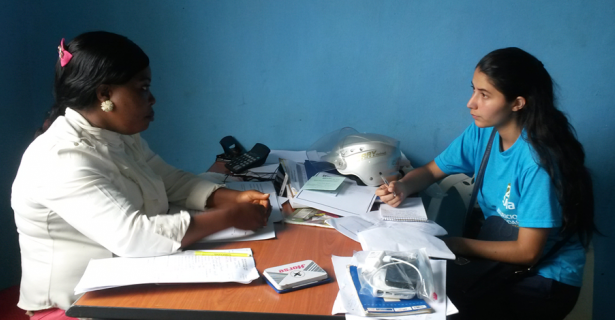Conducting a Key Informant Interview (KII) on the outskirts of Makeni town, Bombali province, Sierra Leone
Today marks the end of the first phase of the Randomized Controlled Trials I have been working on all summer interning at BRAC Sierra Leone's Independent Evaluation and Research Cell. For the past 3 months, along with a team of 5 other people, I have been working on developing quantitative and qualitative tools, collecting data and analyzing that data. I monitored the collection of data in rural and urban settings across Sierra Leone, which gave me the unique opportunity to closely interact with BRAC's microfinance clients and understand the different contexts in which the organization operates. Because this is the first large-scale RCT I am involved in, I have learned a lot about the planning and implementation of research in a developing country context. But more importantly, I have learned that working on the field always brings countless unforeseen challenges. Though I came in understanding the theory behind RCTs, my time in Sierra Leone has allowed me to get a better grasp on the actual implementation of one. Every step of the way we faced challenges, regardless of how much time we spent trying to prevent them. For example, we did our field work during the months of July and August, the peak of the rainy season, which severely limited our movement. We also depended on the support of microfinance field teams, with whom it could be difficult to communicate, which often delayed us. Similarly, our field movement plans frequently had to be altered while in the field to accommodate client movement.
The preliminary findings for our baseline data were very interesting, indicating varying patterns between the three groups: "treatment", "control new" and "control old". For example, we found that "control old", which is comprised of pre-existing BRAC clients, were mostly women whereas the other groups were primarily made up of men. This is probably because clients in "control old" came over from the microfinance group lending schemes that specifically target women. Given the gender dynamics in Sierra Leone, it was not surprising to find that only a very small percentage of those in the "control old" group were heads of their household. Nevertheless, we found that in 70% of the cases, these women were still the main decision-makers in the house.
My time in Sierra Leone has been one of constant learning. I've learned about Sierra Leone as a country, its people and development priorities. I've learned about research and its inherent challenges and limitations. Given my involvement in this RCT, I also had the opportunity to learn how to manage a team, mediate conflicts and increase motivation. I have learned about the unique qualities, but also the difficulties, faced by large organizations that originated in the developing world such as BRAC. All of these are matters that can only be learned through experience, which is why this summer in Sierra Leone has been so valuable to me. Though 3 months is a short period of time, and there is so much more left for me to learn, I look forward to returning to Fletcher armed with this wonderful experience.

